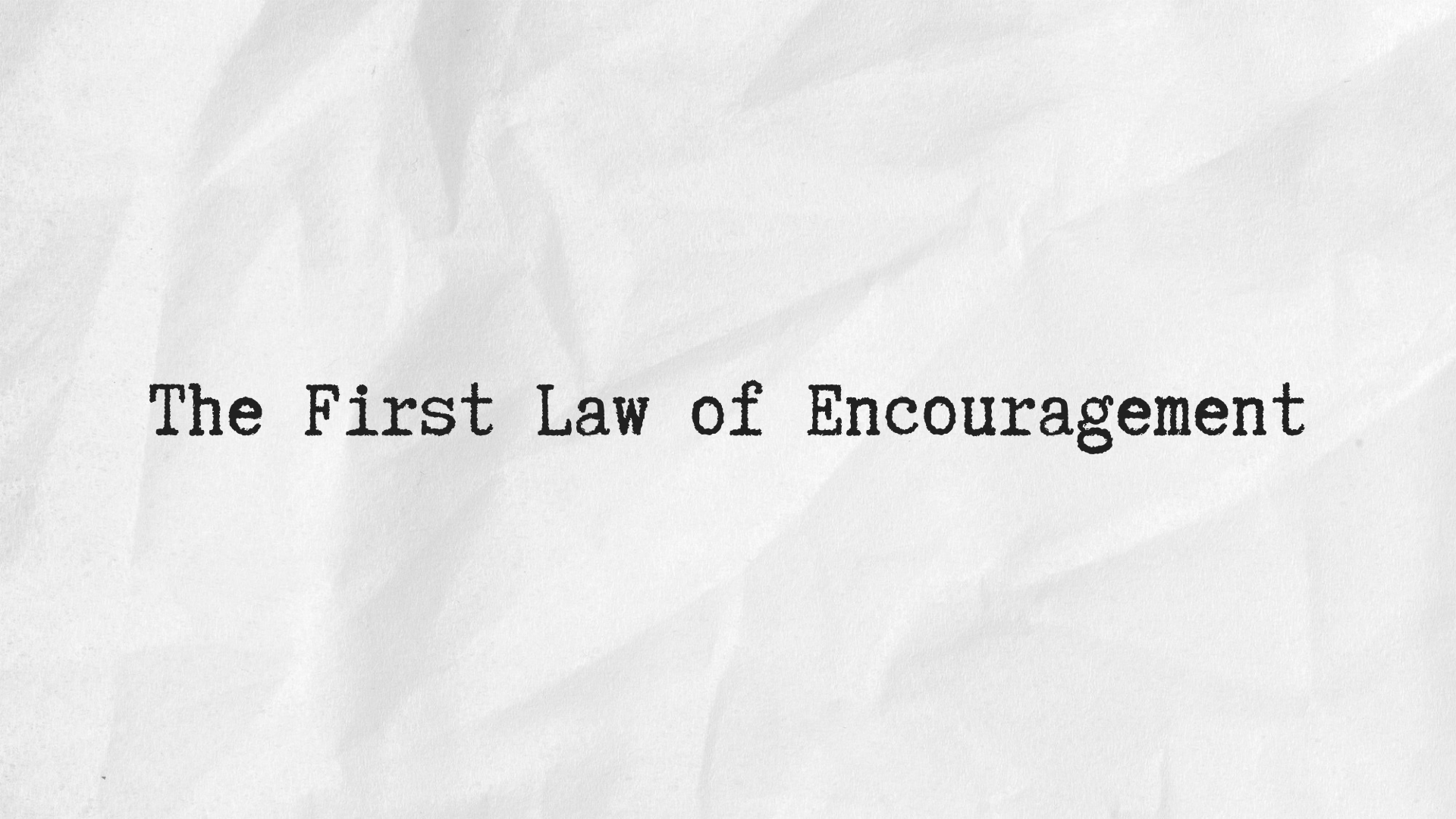Just Go For It
Just Go For It
This Lent, we’re challenging our church to something different. It’s called 40 Days of Rewilding (you can find a more detailed explanation here). The challenge has 3 main parts:
· Replace an empty habit (a habit not supporting our goal of living and loving more like Jesus) with a life-giving habit (a habit supporting our goal of living and loving more like Jesus)
· Invest in a habitat by showing up weekly and intentionally seek to discern and connect the dots of God’s already-at-work presence in that place (could be a coffee shop, home, yard, park, office, social media platform, etc.)
· Discuss your successes, failures, and discoveries with 3 or more people weekly to encourage one another on in love and good works.
The goal with 40 Days of Rewilding is essentially to do what we can, with what we have, so that God can do what we cannot. As we saw in last Sunday’s message, if we never begin to trust God with what we have, it will never be enough. We will only see lack, scarcity, and limitation. However, the moment we place what we have, as small and insufficient as it might be, into God’s hands, then and only then, do we begin to move from completely impossible to absolutely possible.
In many ways, rewilding is simply about going for it. No more excuses. No more reasons why it won’t work. No more hiding behind a false pretense of responsibility and playing things safe.
SOMETIMES YOU JUST HAVE TO GO FOR IT.
Which leads us to 1 Samuel 14:1-14. In this story, a guy named Jonathan (the son of Saul, the 1st King of Israel) reaches a breaking point.
The Israelite army is cornered by the Philistine army. They’re outmanned and outgunned. In fact, there are only two swords in the whole army – one is held by Saul, the other by Jonathan himself.
In 1 Samuel 14, Jonathan has reached his breaking point. He’s had enough.
He’s had enough with the hiding, enough with the fear, enough with the excuses, and he’s come to the decision that’s time to just go for it. For the rest of today’s blog, I’ve decided to mix things up a bit. You might say we’re going to rewild this blog.
What you’ll find below are the scriptures from 1 Samuel with some personal, initial thoughts provided at specific breaks in the text. These are essentially my first reactions to reading through the scripture itself. As we consider what it means to be a people rewilded by the Holy Spirit, I invite you to reflect on my reactions to the text and consider your own as well. This is going to look and feel unfinished and unrefined. That’s honestly the point. In doing this, I want to invite you into my own process of studying scripture with the hope that maybe something you see here might help equip you in your own process. So, grab your Bible and a journal or print this out and may God’s rewilding Spirit stir your heart with wildness and possibility as you read!
One day Jonathan son of Saul said to his young armor-bearer, “Come, let’s go over to the Philistine outpost on the other side.” But he did not tell his father.
· This all sounds a bit irresponsible to me, but as we’ve said the past few weeks: Do the responsible thing until God tells you to do otherwise. And when God tells you to do otherwise, choose faithfulness over responsibility.
· A question worth considering is why did Jonathan not tell his father? Is it possible that Jonathan knew his father would never support such a gutsy action? It makes me wonder if as we get older, we sometimes get too responsible for our own good. I don’t know about you, but I want to live a life of daring faith – the kind of life others would be willing to share their daring plans with.
· One last thought – if people don’t/won’t trust us with their faith-filled seemingly irresponsible plans, are we really living from a posture of faith or is it possible we’ve confused a life of faith with a life of worldly responsibility? Remember, we can be responsible without God, but faith – faith is impossible without God.
2 Saul was staying on the outskirts of Gibeah under a pomegranate tree in Migron. With him were about six hundred men, 3 among whom was Ahijah, who was wearing an ephod. He was a son of Ichabod’s brother Ahitub son of Phinehas, the son of Eli, the Lord’s priest in Shiloh. No one was aware that Jonathan had left.
· There are a lot of details here, so much so that it feels like the text is trying to tell us something, even if what that something is, isn’t quite clear. There may be some cultural/contextual things here that might have been plain to the text’s original audience (or you!) that isn’t quite plain to me. Here, I would go looking for some help in a Bible commentary or other sources. Personally, I like the IVP Background Commentaries. (You can find them here, but they are also available elsewhere and in other formats.)
· Today is about initial reactions more than deep, detailed study so let me offer a few quick thoughts:
· First, there is a stark contrast between Jonathan and his father, Saul. While Jonathan is considering something bold, Saul is chilling beneath a pomegranate tree. While his people are in danger, his army surrounded, and the odds looking terribly against them, Saul sounds like he’s spending a day at the spa. Perhaps there’s something to this.
· Also, there are a bunch of names included. Since names carried meaning back then, it would be worth investigating what these names mean as they may help us understand what’s happening here. For what it’s worth, Ichabod means something like, “God’s glory has departed”. That probably isn’t a good thing.
4 On each side of the pass that Jonathan intended to cross to reach the Philistine outpost was a cliff; one was called Bozez and the other Seneh. 5 One cliff stood to the north toward Mikmash, the other to the south toward Geba.
· As I mentioned earlier, when you get a bunch of biblical names like this, it’s never a bad thing to stop and search their meanings. Even something as simple as googling, “What does the name Bozez mean?” could be a good place to start.
6 Jonathan said to his young armor-bearer, “Come, let’s go over to the outpost of those uncircumcised men. Perhaps the Lord will act in our behalf. Nothing can hinder the Lord from saving, whether by many or by few.”
· Take note of the faith driving Jonathan’s actions. He isn’t certain of what God will do, but he is certain of what God can do. Think about how his thinking might shape our own faith. If you’re like me, I want to know what God will do before I act. Here, however, we see Jonathan driven forward by God’s character and capacity. Jonathan does not know what God will do, but he knows enough about God’s goodness and power to keep moving forward.
7 “Do all that you have in mind,” his armor-bearer said. “Go ahead; I am with you heart and soul.”
· Come on now, don’t we all want someone who has our back like this? This is the kind of life-giving Christian community I think every single one of us crave. But this raises some questions like:
· What kind of life has Jonathan led to earn this kind of respect and trust from his armor bearer?
· Am I leading a life worth following like this?
· Is there anyone in my life I’d follow in this way? We tend to see ourselves as the heroes and main characters in each story, but many times, we need to see ourselves in other roles. Sometimes as the supporting cast and other times, as tough as it might be, even as the less desirable men and women in the stories. If I’m honest, as much as I want to see myself like Jonathan, taking courageous chances on God, I might need to circle back and consider the possibility that my life looks a bit more like Saul’s…chilling safely at the outpost, comfortably under the pomegranate tree.
8 Jonathan said, “Come on, then; we will cross over toward them and let them see us. 9 If they say to us, ‘Wait there until we come to you,’ we will stay where we are and not go up to them. 10 But if they say, ‘Come up to us,’ we will climb up, because that will be our sign that the Lord has given them into our hands.”
· If… Do you hear the faith in Jonathan’s options? I don’t know what’s going to happen here, but if X happens, we’ll call it a day and wait for further instructions. If Y happens, we’ll cross the crag and take the fight to them. Jonathan has enough faith to know when to stop and when to keep going. Sometimes we let our pride push us forward when we should pull back. Sometimes we let our fear hold us back when we should push forward. Jonathan’s sense of self does not rise or fall with what God does next.
· Jonathan is clearly willing to “go for it” but going for it will not take place without the Lord’s leading and guidance. Remember, do the responsible thing unless the Lord says otherwise – then do that.
· Notice Jonathan attaches his next steps to the Lord. For Jonathan, it is clear that his actions are not about how others see him, but how he sees the Lord. He’s not in this for personal honor or glory, but for the glory of God.
· One of the questions this raises for me is, “How comfortable am I in the ‘If’ of life? Another question might be, “Are there places in my life where I am intentionally or unintentionally seeking or pursuing glory which rightfully only belongs to the God?”
11 So both of them showed themselves to the Philistine outpost. “Look!” said the Philistines. “The Hebrews are crawling out of the holes they were hiding in.” 12 The men of the outpost shouted to Jonathan and his armor-bearer, “Come up to us and we’ll teach you a lesson.” So Jonathan said to his armor-bearer, “Climb up after me; the Lord has given them into the hand of Israel.”
· Something small I love about this moment is Jonathan doesn’t waste anytime responding to the insults of the Philistines. I wonder how much energy and time I’ve wasted responding to words, accusations, insults, and remarks that have actually distracted me from God and the purpose He has for my life. When you’ve chosen a life of purpose over pleasure, there is no greater pleasure than to live in alignment with God’s purposes for your life. And when your delight is in God, in who He is, and who He has called you to be, the need to respond to such comments begins to dissipate.
· This is also the moment Jonathan and his armor bearer have to go for it. The time for talk is over. This is where the rubber meets the road.
· Knowing what to do is one thing; actually doing it is another matter altogether.
· Notice that even as they begin to climb, they do so with their attention set on the Lord. This has never been about Jonathan (or his armor bearer). This has never been about their glory or name. They sought God’s favor before they acted and even as they act, they continue to keep Him ever before them. Makes me wonder – am I keeping the Lord before me before I begin, as I am in the middle of doing, and even after I’ve done whatever it is that I’ve done?
13 Jonathan climbed up, using his hands and feet, with his armor-bearer right behind him. The Philistines fell before Jonathan, and his armor-bearer followed and killed behind him. 14 In that first attack Jonathan and his armor-bearer killed some twenty men in an area of about half an acre.
· Some applications to consider from the text:
· While we may struggle with the violent nature of the story, let’s not miss how the text substantiates Jonathan’s conviction in verse 6: God is not limited in his capacity to save. Whether by many or by few, God is able to do infinitely more than we can think or imagine (Ephesians 3:20)
· Another application we might draw from this story is that no challenge before us is either too big for God’s power or too small for God’s concern. He sees it all. We might say that, “If God calls us to it, He will equip us for it.”
· Assuming Saul, as King, should have been leading the way, we also see that God is willing to act through others, not just the people or persons we assume are in charge. We don’t have to wait for others to lead, but we do have to wait for the leading of God. (vs. 8-10)
I hope this raw, unrefined look at 1 Samuel 14 has helped shine some light on the text and has given you a better sense of what it means to “just go for it”. Being rewilded by and for God invites us to step out in faith and takes risks, but we pursue these risks according to God’s purposes and leading – not simply because we want to do something new or different. We don’t have to wait for the kings of this world to come out from beneath their pomegranate trees – God is waiting for people just like you and me to take what we have, step out in faith, listen for God’s leading, and to follow that path to wherever he leads.
And trust me, wherever that path leads, God goes with you.
Sunday Morning Service Times:
9:00 AM Traditional
10:30 AM Contemporary
About:
Here at Deer Lake, we want to be the church IN the Community, FOR the Community to the glory of God and for the sake of the world.








